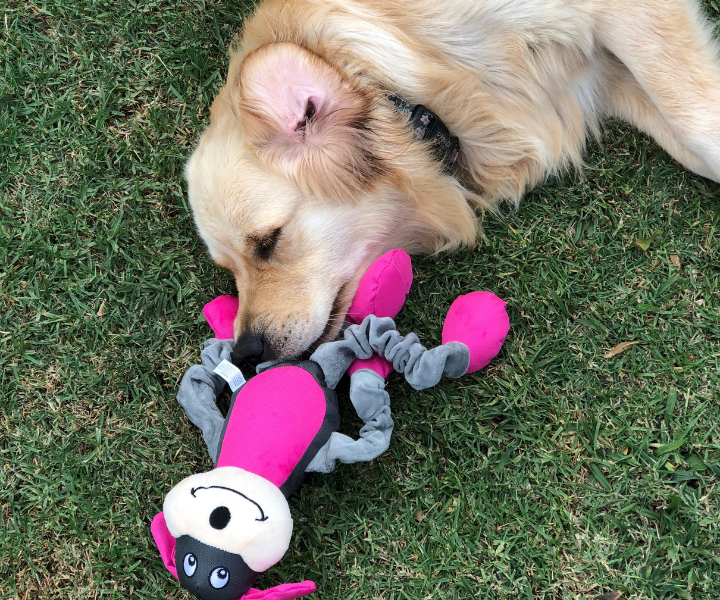
The Science of Plush Toys: How They Help with Anxiety and Stress in Dogs
Share
The Science of Plush Toys: How They Help with Anxiety and Stress in Dogs
Dogs are known for their loyalty, their playfulness, and their unwavering love. But just like humans, they can also suffer from anxiety and stress. Fortunately, there is a simple solution that can help: plush toys. Yes, you read that right. Plush toys are not just cute and cuddly, they can also have a therapeutic effect on dogs. But how exactly do they work? What is the science behind it? In this article, we will explore the fascinating world of plush toys and their impact on canine mental health. From the psychology of comfort objects to the benefits of tactile stimulation, we will delve into the research and uncover the secrets of these furry little friends. So, whether you have a nervous pup or just want to learn more about the science of dog behaviour, read on to discover the fascinating world of plush toys and their role in canine wellness.

How Plush Toys Help Dogs with Anxiety and Stress
The idea of using plush toys to help dogs with anxiety and stress is not new. In fact, it has been around for a long time. Plush toys, also known as comfort objects, are objects that provide a sense of security and comfort to dogs. They can help reduce anxiety and stress by providing a distraction and a sense of familiarity. Dogs often form strong attachments to their comfort objects, and these objects can help them feel safe and secure in stressful situations.

Several studies have shown that dogs with plush toys exhibit less anxious behaviour, such as pacing, panting, and whining, than dogs without them. In a study published in the Journal of Veterinary Behaviour, researchers found that dogs with a comfort object had lower cortisol levels, a hormone associated with stress, than dogs without one. Another study published in the same journal found that dogs with plush toys were more likely to play and explore their environment, which is a sign of reduced anxiety.
The Science Behind Plush Toys and Their Impact on Dogs
So, how exactly do plush toys work to reduce anxiety and stress in dogs? The answer lies in the psychology of comfort objects. Comfort objects, including plush toys, work by providing a sense of familiarity and security to dogs. When a dog has a comfort object, it reminds them of their mother or littermates, which provides a sense of safety and comfort. This is because dogs are social animals, and they rely on social bonds for their emotional well-being.
Additionally, plush toys can provide tactile stimulation, which can be calming for dogs. The soft texture of the toy can provide a soothing sensation for dogs, similar to how a weighted blanket can be calming for humans. The act of chewing and playing with a plush toy can also release endorphins, which are natural chemicals in the body that promote feelings of pleasure and well-being.

Choosing the Right Plush Toy for Your Dog's Needs
Now that you understand the benefits of plush toys for dogs, the next step is to choose the right one for your furry friend. When selecting a plush toy for your dog, there are a few things to keep in mind. First, choose a toy that is appropriate for your dog's size and breed. A toy that is too small can be a choking hazard, while a toy that is too big can be difficult for your dog to play with.
Second, consider the durability of the toy. Dogs are notorious for chewing, so choose a toy that can withstand some wear and tear. Look for toys that are made of sturdy materials, such as reinforced seams and heavy-duty fabric.
Finally, choose a toy that your dog finds appealing. Dogs have different preferences when it comes to toys, so observe your dog's behaviour and choose a toy that they enjoy playing with. Some dogs prefer toys that squeak, while others prefer toys that can be chewed.

Tips for Introducing Plush Toys to Your Dog
Introducing a new plush toy to your dog can be an exciting experience for both you and your furry friend. Here are some tips to help make the introduction smooth and stress-free:
- Introduce the toy slowly: Allow your dog to sniff the toy and get familiar with it before encouraging them to play with it.
- Use positive reinforcement: Encourage your dog to play with the toy by offering treats and praise.
- Supervise playtime: Watch your dog while they play with the toy to ensure they are not chewing on it excessively or swallowing any parts.
- Rotate toys: To keep your dog interested in their plush toys, rotate them frequently and introduce new ones periodically.

Maintaining and Cleaning Your Dog's Plush Toys
To keep your dog's plush toys clean and hygienic, it is essential to maintain them regularly. Here are some tips for cleaning and maintaining your dog's plush toys:
- Wash in the washing machine: Most plush toys can be washed in the washing machine on a gentle cycle. Use a mild detergent and avoid fabric softeners.
- Hand wash: For toys that are too delicate for the washing machine, hand wash them with a mild detergent and warm water.
- Air dry: Hang the toys to air dry or place them in the dryer on a low heat setting.
- Inspect regularly: Check your dog's plush toys regularly for signs of wear and tear, such as loose threads or stuffing coming out.
Other Ways to Help Your Dog Cope with Anxiety and Stress
While plush toys can be an effective tool for reducing anxiety and stress in dogs, they are not the only solution. Here are some other ways to help your dog cope with anxiety and stress:
- Exercise: Regular exercise can help reduce stress and anxiety in dogs. Take your dog for daily walks or engage in other physical activities, such as playing fetch or swimming.
- Training: Training can help your dog feel more confident and secure. Consider enrolling your dog in obedience training or working with a professional dog trainer.
- Calming aids: There are several products available that can help calm anxious dogs, such as, Aroma Dog Calming Fleece Security Blanket, calming collars, pheromone sprays, and supplements.
- Professional help: If your dog's anxiety or stress is severe, consider consulting with a veterinarian or animal behaviorist.

Conclusion
In conclusion, plush toys can be a simple and effective solution for reducing anxiety and stress in dogs. They work by providing a sense of familiarity and security to dogs, as well as tactile stimulation and the release of endorphins. When choosing a plush toy for your dog, consider their size, breed, and preferences, and choose a durable option that can withstand some wear and tear. Remember to introduce the toy slowly and supervise playtime to ensure your dog is safe and not chewing on the toy excessively. By using plush toys and other techniques, you can help your furry friend feel calm, secure, and happy.
Let's find your dog's new Plush Toy!
